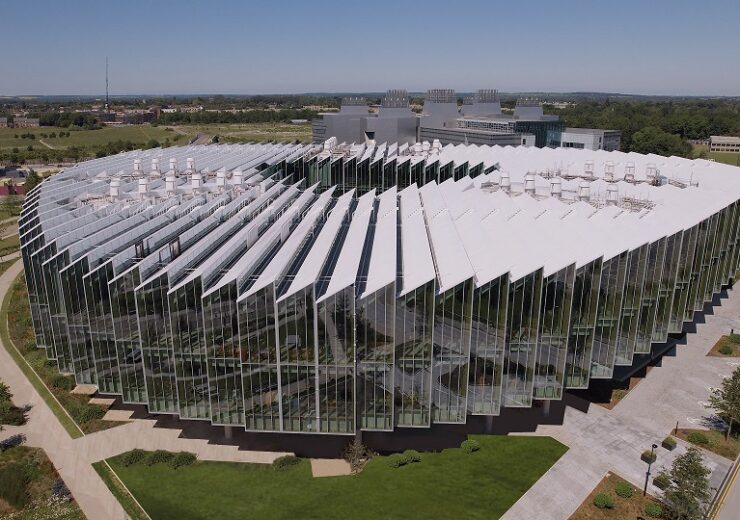The first Phase 3 results for AstraZeneca and Daiichi Sankyo’s TROP2-directed antibody drug conjugate showed a statistically significant improvement in progression-free survival in previously treated metastatic NSCLC

AstraZeneca’s The Discovery Centre overhead view. (Credit: AstraZeneca)
AstraZeneca has unveiled positive results for its investigational antibody-drug conjugate (ADC) datopotamab deruxtecan (Dato-DXd) from the Phase 3 TROPION-Lung01 trial.
The Phase 3 study evaluated the efficacy and safety of Dato-DXd compared to docetaxel in previously treated patients with metastatic non-small cell lung cancer (NSCLC).
In the study, the ADC drug showed a statistically significant improvement for the dual primary endpoint of progression-free survival (PFS) compared to docetaxel.
For the dual primary endpoint of overall survival (OS), the study data is not mature, but showed a positive early trend that did not denote statistical significance.
The British drugmaker plans to continue the clinical trial to assess OS with more maturity, while the investigators and participants will remain blinded to the results.
The drug resulted in deaths due to interstitial lung disease, but showed a safety profile that was in line with previous clinical trials, with no new safety signals identified.
AstraZeneca oncology R&D executive vice president Susan Galbraith said: “With TROPION-Lung01, we met the dual primary endpoint of progression-free survival, challenging the entrenched standard of care in a previously treated and unselected patient population that has long deserved an alternative to chemotherapy.
“These first Phase III trial results from the datopotamab deruxtecan clinical programme provide compelling evidence for the potential role this TROP2-directed antibody-drug conjugate can play in treating patients with lung cancer.”
Datopotamab deruxtecan is a specifically engineered TROP2-directed DXd ADC, being jointly developed in partnership with Japanese pharmaceutical company Daiichi Sankyo.
TROP2 is a protein highly expressed in a large majority of lung cancers, and currently, there are no TROP2-directed ADCs approved for the treatment of patients with lung cancer.
In July 2020, AstraZeneca and Daiichi Sankyo signed a collaboration agreement to jointly develop and commercialise datopotamab deruxtecan.
The drug is designed using Daiichi Sankyo’s unique DXd ADC technology and contains a humanised anti-TROP2 IgG1 monoclonal antibody.
The monoclonal antibody was developed in collaboration with Sapporo Medical University.
Datopotamab deruxtecan is currently being developed through more than 12 clinical trials evaluating its efficacy and safety across multiple TROP2-targetable tumours.
Daiichi Sankyo oncology R&D global head Ken Takeshita said: “We are encouraged by the statistically significant results of the dual primary endpoint of progression-free survival seen with datopotamab deruxtecan and look forward to the final overall survival analysis.”
